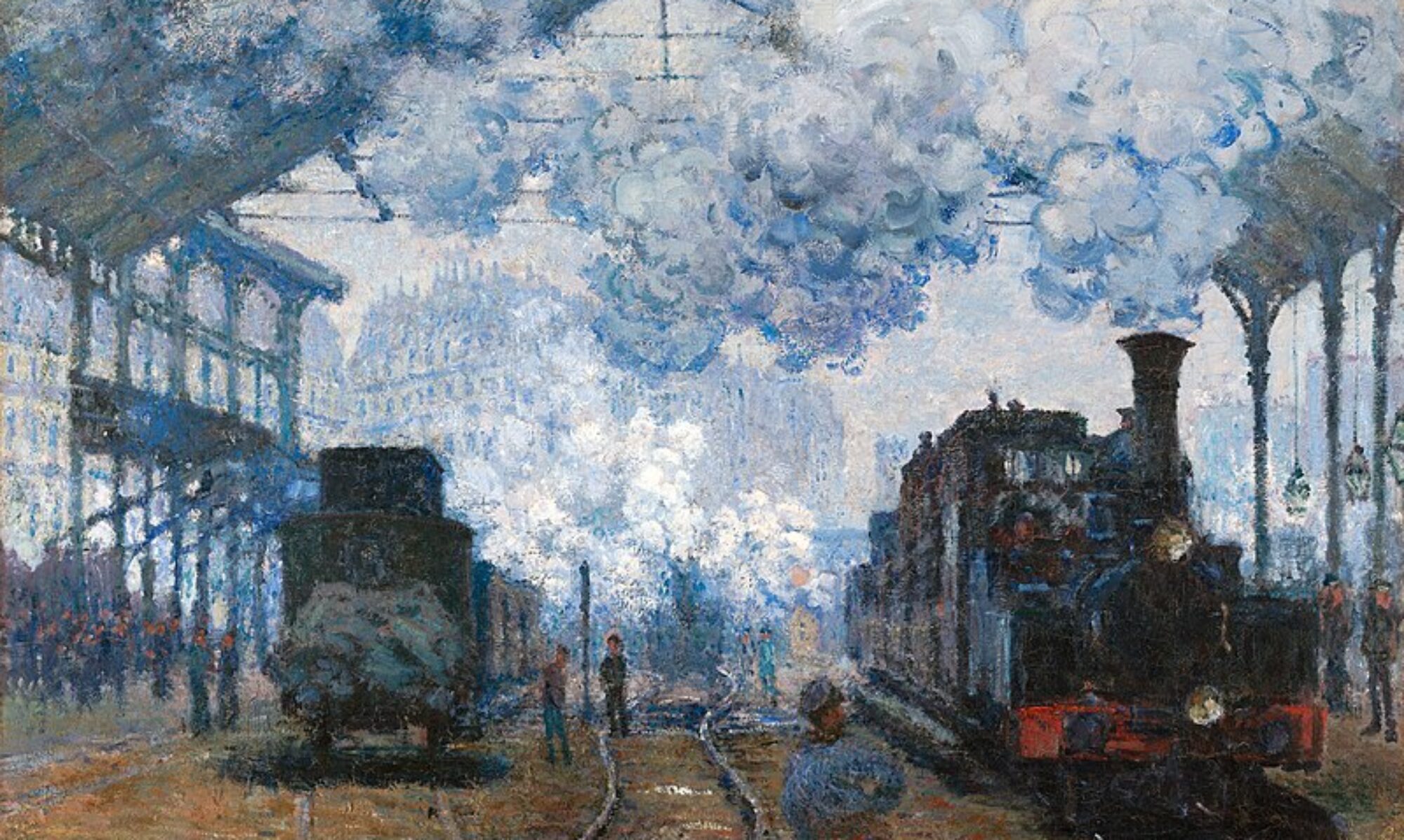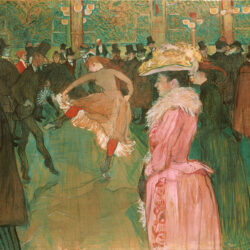Although the sections are short, one of the recurring themes I saw in Chinua Achebe’s Things Fall Apart is the performance of masculinity. In fact, a large part of the protagonist is centered around his dedication to behaving as masculine as possible. Okonkwo is very physically strong and behaves aggressively; “whenever he was angry and could not get his words out quickly enough, he would use his fists” (1). It is clear through his actions and attitudes that he equates masculinity with worthiness or virtue and this is coupled with a virulent distaste for femininity, in both women and men, especially his father. In fact, “[Okonkwo] had no patience with his father” (1) and attempts to be the antithesis of him, where his father was thin, he is huge, where his father was a coward who can’t stand the sight of blood, he is a man of war who welcomes it. In essence, his “whole life was dominated by fear, the fear of failure and of weakness… it was the fear of himself, lest he should be found to resemble his father” (4). In the beginning, these actions and attitudes have brought him wealth, fame, family, and respect but we see later in the reading that he faces some consequences and is exiled for seven years. What is your impression of the message that Achebe is trying to convey? Are Okonkwo’s displays of toxic masculinity something to condemn or is there another problem with his character? How do you view his feeling about his father and how he allows them to drive his life?
Symbols for White Colonizers
In chapter 15 of Things fall apart, Okonkwo was talking to Obrierika about a white man coming during the planting season. The people asked the Oracle and it replied saying ” the strange man would break their clan and spread destruction among them”(97). They later go on to say that the white men were on their way and described them as locusts. Why do you think they chose a locust to symbolize the white colonizers?
The Shopping Habits of Women
In Émile Zola’s, The Ladies Paradise, he writes about the growing consumer culture in France during the 1870s. Zola tends to describe women as weak individuals who are easily overcome with temptation and unable to control their passions for materialistic goods, such as clothing. For instance, when Zola is mentioning the shopping habits of Madame Marty he states, “She was known for her passion for spending, her inability to resist temptation, strictly virtuous she was, and incapable of yielding to her lover; but no sooner did she set her eyes on the slightest piece of finery than she would let herself go and the flesh was conquered.” Zola indicates that women like Madame Marty are morally strict in every way expected of a woman except they always gives into their passions and temptations for material possessions. Also, Zola appears to promote the notion that women can be “bought” or coerced by providing them with material goods. For instance, Zola mentioned how Madam Marty was “conquered” as soon as she saw a piece of finery. Basically, Zola is stating that women have at least one very strong weakness that makes them “conquerable” and capable of being taken advantage of. (Zola, 62) How can Zola’s depiction of women be harmful? Would liberal capitalists attempt to profit off of the “vulnerability” of women? Also, would other French individuals use the assumption that women cannot be trusted with their husbands’ money because they are financially irresponsible and weak as justification to monitor their expenses more strictly?
Ladies’ Paradise
In the Ladies’ Paradise, by Emile Zola, it is obvious that Zola depicts this story with women being materialistic, whereas the men are opportunistic. The women brag about their personal belongings in discreet ways, the men use the women to their advantage and by doing so they put their own personal gain in front of their relationships. Why is it people with “class” lack morals? What do you think this says about the society and time they lived in? Do you think everyone was as egotistical as they were?
Discussion Questions
Do you think Zola is advocating for the working class to advance or is any discussion of this just banter meant to represent talks of the time period?
What do you think of the Quote on page 66 that says, “Everything happens, and nothing happens.”
How do everyone feel about the posseive nature used when the men talk about using women for sating their “passions” (wants)
Did anyone find it weird that a piece called The Ladies Paradise was so focused on men and their dealings, at least in many parts of chapter 3
Wealth and Class
In all of history, there has often been the question of how does class structure affects the wealth distribution amongst the people, this was a common issue in Paris. In the reading The Ladies Paradise, two old schoolmates and friends from different social standings meet each other after going on their separate ways. It is stated on page 64, “In spite of their different natures, a close comradeship had made them inseparable until the baccalauréat, which they passed, one with distinction, the other just scraping through after two failed attempts.” (Zola 64) As readers, we are at first not told which friend had the high earning distinction and who just barely passed. It is later noted that the poor friend who could not use his diplomas to help his station was the one who passed with honors. After his father’s passing his family was left struggling and despite his education, he could not help them. The friend who barely passed continues to bask in wealth due to his station and not due to his work. He even scoffs at his friend’s 3,000 Francs per year.
Now it would be fair to think that Vallagnosc would be angered at his station, but he appears to just be focused on supporting himself and his mother and sisters the best he can. His friend Mouret, much like many of the wealth often do to the underclass they see as below them, goes on to brag and subliminally mock his old friend. He muses how even though Vallagnosc was educated and well accomplished a simple minded sales boy made more Mouret than Vallagnosc would earn in a year.
How is the treatment of Vallagnosc by Mouret reminiscent of class divides amongst people in France and Europe overall in the 19th Century?
humanity intervention
Darwin states that man can methodically select the perfect greyhound by intervening in natural selection. this is that humans can now breed two things that are close enough to each other to create something. this has been around longer than Darwin had said it to be a thing but this is the first time that i can think of where humans intervention in the nature world is being written about. It also seems to me that this is very overlooked when considering humans place in the world. for we are the first species to “play god” in a sense of knowing that we are adopting other animals to our own advantages. this leaves me with a lot of questions. From Darwin’s time have we seen an evolution of the animals we call pets? another aspect that is connected to Darwin’s concept is the fact that animals are now being breed to have attributes that actually hurt them and can cause them to have serve issue in life. an example of this is a pug they struggle to breath solely because humans have breed them to look like that. For me this brings up an ethical question to this ability, when is modifying animals to far? why?
Darwinism Applied to Society-10/20
In The Origin of Species, Darwin presents his theory of natural selection. While he is speaking scientifically, he does use humans as an example to support his argument, “No country can be named in which all the native inhabitants are now so perfectly adapted to each other and to the physical conditions under which they live, that none of them could anyhow be improved; for in all countries, the natives have been so far conquered by
naturalized productions, that they have allowed foreigners to take firm possession of the land. And as foreigners have thus everywhere beaten some of the natives, we may safely conclude that the natives might have been modified with advantage, so as to have better resisted such intruders.” (pg. 103).
This ‘example’ of how nature has room to improve, and that natural selection is just a process of learning how to survive better is extremely problematic when you try to apply it to human society instead of genetic traits. He implies here that all the native people of other countries just didn’t evolve well enough to prevent their own oppression. This implies that the oppressors (in this case Europeans) are somehow more evolved because they weren’t oppressed by foreigners. While he did not believe in Social Darwinism, do you think that phrasing his argument like this could have contributed to it? Why was that such a popular idea among the upper class in Europe, and what purpose did it serve?
Declaration of Principles
Throughout “Duties to Country”, Mazzini makes some points that would lead the reader to think that he was an ally to the working class of Italy. He talks about the poor social conditions of the working class, but the quote that caught my attention is when he says “Your emancipation can have no practical beginning until a National Government, understanding the signs of the times, shall, seated in Rome, formulate a Declaration of Principles to be a guide for Italian progress, and shall insert into it these words, Labour is scared, and is the source of the wealth of Italy” (283). While the idea that labour is sacred does sound like progress for better conditions for the working class, the other parts of this quote suggest that this might not be the case. By saying that labour is the source of Italy’s wealth, Mazzini is encouraging more hours for these workers that are already pushed to their limits. Right before this quote, he also says that “The economic problem demands, forth and foremost, an increase in capital and production” (283). Both of these statements by Mazzini suggest that in order for Italy to get wealthy, the working class must be given more hours than they are already suffering through, so this idea that “labour is scared” seems like it will do more harm than help to the working class, but do you think otherwise?
Make it make sense
In Duties to country, by Giuseppe Mazzini, it is obvious that Mazzini thinks to have a country there must be unity. On page 285 it says, “ There is not true Country where the uniformity of that right is violated by the existence of caste, privilege, and equality-where the powers and facilities of a large number of individuals are suppressed or dormant-where there is no common principle accepted, recognized, and developed by all”(Mazzini,Pg.285). What Mazzini means when he says this is that no one should be above or below anyone else. Even though he believes this he is suppressing the beliefs of other people. Do you think that when he says stuff like this, he realizes he’s going against his own words?

